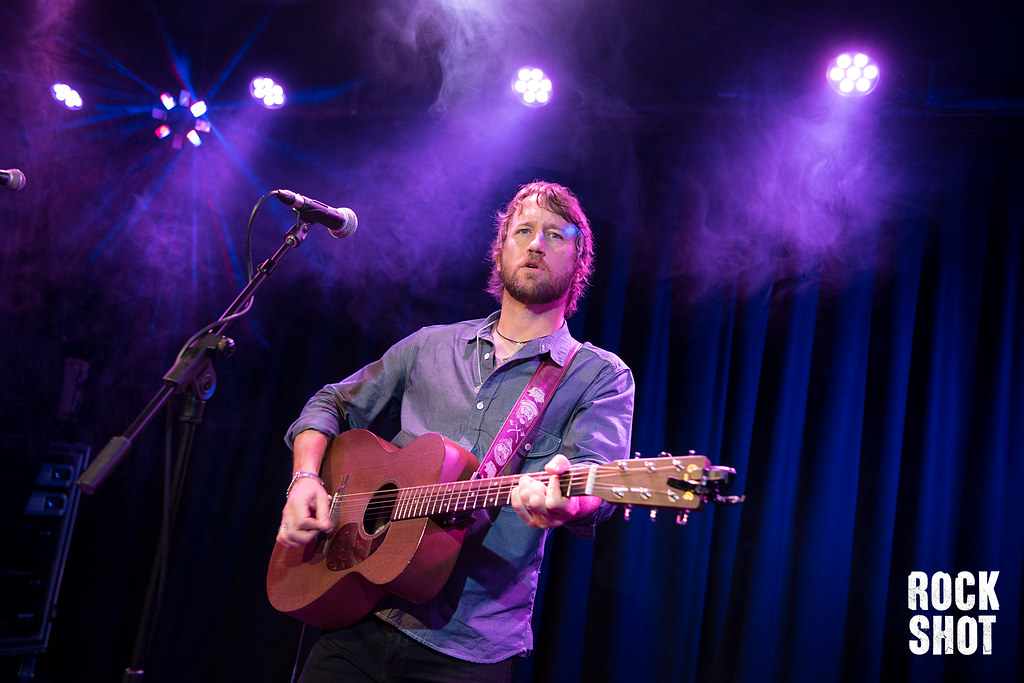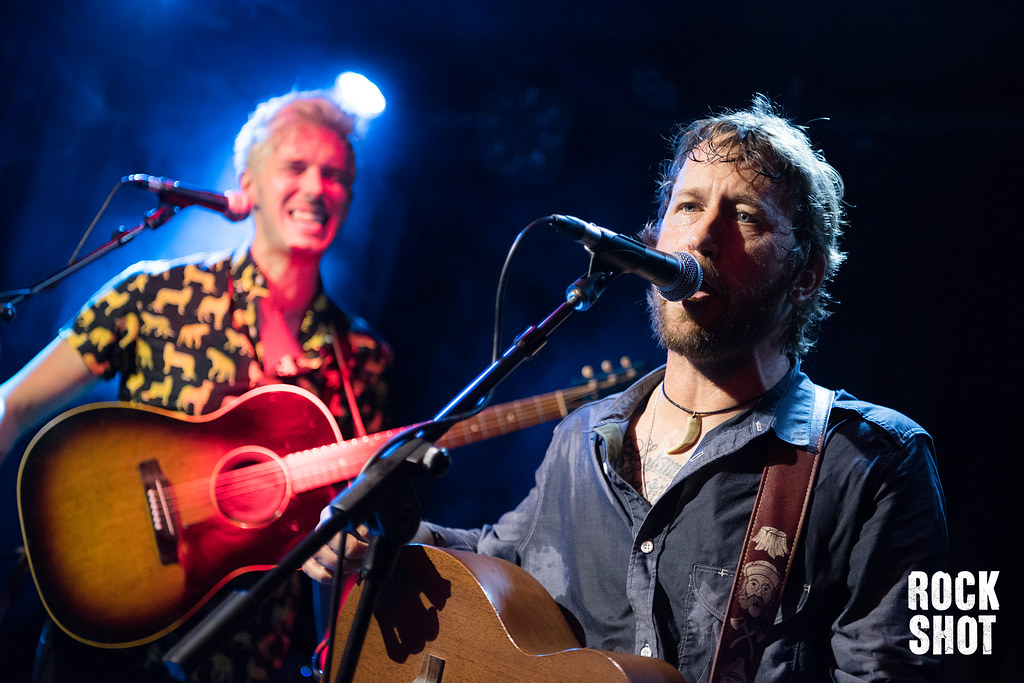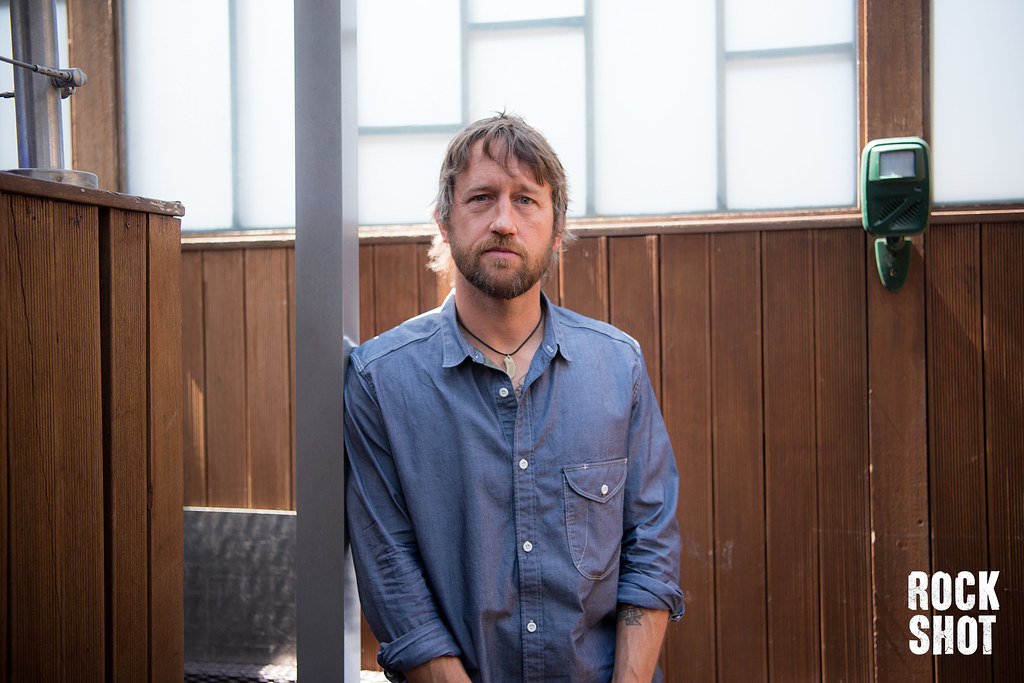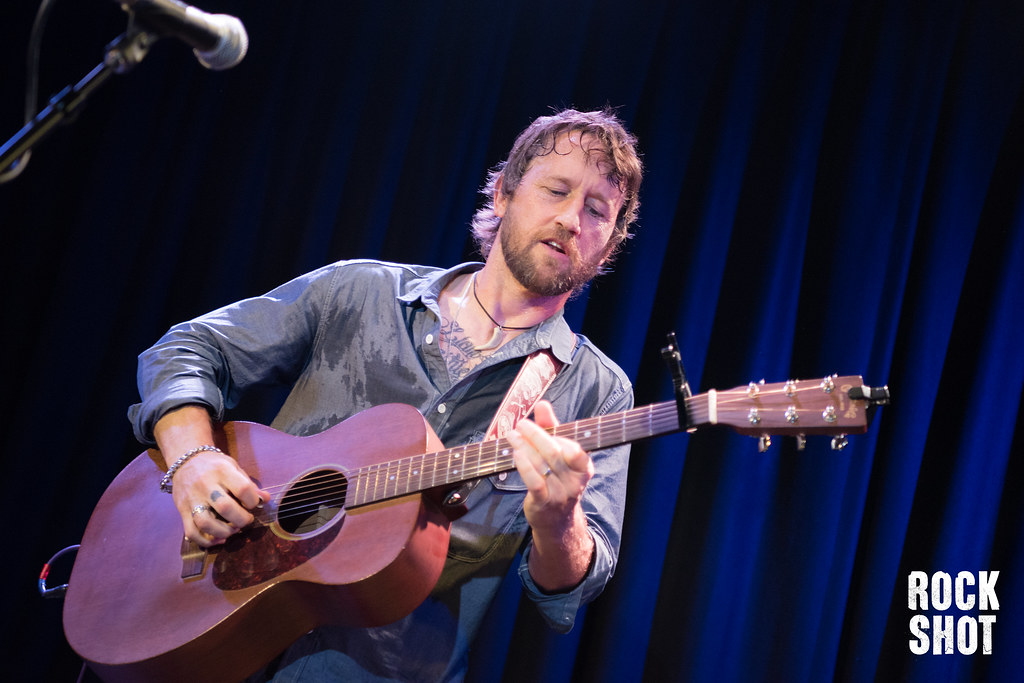Chris Shiflett is probably known to most as the superstar guitar player with American stadium rockers Foo Fighters. But the axe man has been pursuing his own solo career for a number of years now, putting out Country and Americana-influenced records.Ahead of kicking off a summer of madness, hitting up the festival circuit with Foo Fighters, Shiflett took the time out for some tiny London acoustic shows to showcase his other side as well as sitting down with RockShot Music Magazine to chat about his adventures into Country, being a busy dad and his new record West Coast Town.
Chris, how did tonight’s Water Rats show come about?
I emailed our booking agent over here to try to find a couple of shows because I knew I had a couple of days heading into this tour. The one with Nic [Cester of Jet] came up and we had to get in on that. We had to find another place and the only thing that I wanted, put me in the smallest room you can find.
Is part of the ambition of your music to play for people who are finishing up work and having a few beers and have one guy drive the entertainment?
Certainly, if you’re thinking in terms of the Honky-Tonks up in Bakersfield, the farm workers and guys working in the oilfields, that’s definitely at the heart of where honky-tonk comes from for sure. They say that Country music out of Nashville came from the church but Country music on the west coast came out of the Honky-Tonks.
Is that where this style of music comes from?
It’s interesting playing acoustic shows, normally I would do this with a full band. The songs were written on just an acoustic guitar but that’s definitely not how I’m used to performing them, so it’s exciting. I would listen to what Dave Cobb [producer/rhythm guitarist] plays on the record, he played all the acoustic guitar on there, and it’s more strummy. I was doing more of the lead stuff and I can’t really do that and sing at the same time.
So tell us a little about your song-writing process, I understand that you worked with Brian Whelan on some of the songs on West Coast Town?
Whelan’s a good friend of mine but I’m a huge fan of him as a singer and a song-writer. I think we co-wrote four tunes on the record and they were songs that I had gotten as far as I could get them. Brian helped a lot, he changed just the odd chord here and there, maybe simplify this part, change the vocal melody a little bit. I haven’t done a lot of co-writing but because me and Brian are friends and have played together through the years, it’s comfortable.
And how about some of the themes, there are comedy mentions of drugs, smoking and alcohol?
I didn’t realise how many times I referenced smoking, I don’t smoke! I kinda party smoked when I was younger but I was never much of a serious smoker and then when the record was done, I realised: god, I reference smoking in, like, every song.
It’s all just about me and my life experience; I will say that I tend to write a lot about a certain period. My life [now] is really nice, I’m married and I have kids, I drive a minivan, I take my kids to soccer practise, we live in a nice neighbourhood and all that sort of stuff, and I’m not super-drawn to write about it, I don’t even know how to write about it.
I tend to write about a time in my life that was a little more chaotic. I remember saying to Peter Case, who’s a great song-writer, “I always write about this period of my life, from my late teens to my late twenties, for whatever reason that’s where I always go” and he said “What the fuck are you talking about? We live in the most chaotic, interesting time ever in the history of man, how can you not write about shit that’s happening now?”
Did you have a blue collar job at all?
I’ve had all the shitiest jobs you could imagine. The worst job I ever had, hands down, was washing dishes in a restaurant. It was me and some ex-cons, I was 15 years old. I hated that job so much I didn’t even go back to get my paycheque!
My mom was a probation officer and when I turned 18 she said “I got you a job at the probation department”. She made me get a job as a clerk and that job was really life-changing in a big way because I saved up enough money to buy an amp and put my first month’s security deposit down on an apartment in L.A.
It propelled me into leaving home and it also gave me this odd thing where I always worked in low-end office work. I remember this point where I was making $10 an hour thinking ‘I’m fucking doing great, got rent covered’. So many of my friends didn’t have jobs and couldn’t get by but I always had a job, I was the guy that was out all night and still made it to work at eight in the morning.
Did your parents introduce you to Country music?
No. My mom was into James Taylor, Fleetwood Mac and stuff like that. My dad was the one that got us into some good shit; he was into Dylan and The Beatles, Stevie Wonder and Bob Marley. I feel like he put us on that path but really it was my older brothers that I followed musically and we didn’t listen to Country at all.
When my mom was a kid Country music was everywhere, that wasn’t my experience. But there were remnants of that still left that I never noticed growing up and it wasn’t until later as an adult I got into Bob Dylan and Merle Haggard that I started to realise: oh shit, when I went to The Palomino to see NOFX it was this famous old Honky-Tonk in L.A. Or when I went to the Foothill to go see Jawbreaker, I just thought it was some dumpy old bar, I didn’t know the history of these places.
What started you on the path to recognise those musicians?
There was always an underbelly of it in punk rock scene, bands like Ex that would draw from a lot of Roots music. When I first moved to L.A. there was Burgundy Room, there was always a Rockabilly contingent or Swing music, I loved all that shit but it wasn’t my first love. Anything kind of old and retro, Frank Sinatra, whatever it was, I was just drawn to that.
I remember buying a Patsy Cline record when I was about 18 and first moved to L.A., that and Johnny Cash and Hank Williams really drew me in. It was a little bit later when I was in No Use For A Name that the singer was really into all the Country stuff that was happening in the nineties, Ryan Adams and Whiskeytown, Old 97’s, I loved all those bands, and that really started to lead me down the road.
Your opening act for tonight’s Water Rats show is Brit Sam Palladio, famous for his role in the Country Music TV show Nashville. How familiar are you of the growing popularity of Country Music in the UK?
I keep hearing that, yeah, it’s cool to hear. That show, even though it’s supposed to be mainstream Nashville, a lot of the music has more in common with Americana. I think the cool thing about that show is that it’s turning people onto what I think is the better side of Country music. Modern Country music is more like Pop music, there’s the poppy accessible stuff and then there’s the underbelly, I tend to go with the underbelly.
Mainstream modern Country music is one of the last punching bags left for people to make fun of in music and it’s a little unfair but the stuff that I listen to is classic Country and the current stuff like Stapleton, Jason Isbell, Lucinda Williams, that’s just what I’m drawn to.
Is there anything you do when recording that helps it veer away from dangerous-sounding, poppy multitrack records?
Oh definitely. On my record, the most important thing is that all the basic tracks are live with bass, drums, Cobb on acoustic guitar and me on electric guitar and singing too, some of the vocals we use but most we re-cut after the fact. In addition to the four of us playing and tracking everything that way, we didn’t use a click, so there’s no click track and that right there creates a very different sounding record, it gives it that ‘live in a room’ kinda feel which has been rung out of most modern music. On top of that we didn’t go crazy with layering it, we put some keys on there, some steel, I put some additional guitar tracks.
The reason I wanted to work with Dave Cobb is because I’m a huge fan of his sound, so I wanted his influence on my record. When my instinct was telling me to resist some suggestion, I really just tried to resist, and I’m glad I did. [Cobb] was the most important guy in the room in terms of influence.
What was that room like? Was it done in a short period of time, because I can imagine you’re busy touring?
Well I wasn’t last summer, I had some time off and as it happened my wife was taking my kids out of town to go visit her sister for pretty much most of that period too and I wasn’t going on that trip so the stars really just aligned. To get to go spend a few weeks in Nashville was heaven. I’ve never spent that much time out there and I really enjoyed it. It allowed me to be totally, 100% in my record, that’s all I did. I didn’t really go out to see bands, I’d just wake up every day, whatever it was we were working on that day I’d be tweaking and thinking about before I went to the studio.
The way that Cobb works is different. Normally, you get into the studio and you’re all ‘go, go go, work, work, work, gotta jam as much as we can’. But he doesn’t work like that, he’s like: “Let’s start at one”. We’d get in there and fuck around for a couple of hours, eat, drink coffee, shoot the shit and then we’d start working. We’d get one song in the can and he’d say “Let’s go to Carter Vintage and look at guitars”. The very last day I was there at two in the afternoon, we finished the last mix and the album was done.
Do you have a favourite track on the album?
Ultimately my favourite’s the title track. It’s the song that changed the most from the demo version I did, we just flipped it on its head turning it into a very different thing and lyrically it’s the closest to my heart. I’m really just describing my childhood, I grew up in this house on Salinas Street like it says in the song, the house next door was this low rider club called The Brown Sensations and every weekend they’d have these parties there with Mariachi music blasting. They used to drive me fucking nuts ‘cause it would keep me up at night, so that’s what I’m talking about.
Does that stem from getting to a point in your life where you want to start documenting it?
In a way, I never really thought about it but I’m sure it kind of is. I was kind of inspired actually by this David Allan Coe song and I wanted to write a song about my home town because the older I get, the more I love where I came from. My wife and I talk about it all the time because she’s from Santa Barbara too and we want to move back up there, we just haven’t been able to figure that out yet.
I tried to write it a few times and trying to base it off this David Allan Coe song which has a very different lyrical tone to it and I just couldn’t get it. There’s one lyric in the chorus: “We don’t fuck around” and I actually took that from something completely unrelated. In boxing there’s a fighter named Canelo Álvarez and he’s gonna fight this guy Triple-G [GGG] in the fall. They were interviewing him asking “when are you going to fight GGG? Are you ducking the fight?” and his answer was: “In Mexico, we don’t fuck around!” and I thought I’ve got to use that, so I just stole that from him.
When the Santa Barbara boy starts moving about the southern states, are you accepted by the locals there?
It’s funny, I noticed this the first time I toured in the southern part of America, we grow up with all these stereotypes – I grew up watching Dukes Of Hazzard, Hee Haw and stuff like that – you just think you know what the south is. But when you actually go to the south it’s so radically different. The great divide in our country is more between cities and country. The culture of the Pacific Northwest is not going to be the same culture you’ll find in Texas. A lot of this has changed now because of globalisation and technology, so stuff might look the same and things are becoming more the same all over. But I like regional differences, I like going to the south.
A million times in my life I’ve been hanging out with people with very different political views but the thing you take away from that is most of what divides us all is by design and when you’re actually face-to-face with people you have way more in common and it’s a lot easier to find common ground, it’s not even easy, it’s natural.
I think for people like me that follow politics closely and think about that stuff a lot, you tend to think that everyone is a dyed-in-the-wool one side or the other, but most people aren’t just like in music. I’m a musician, I grew up as a snobby, opinionated music lover thinking ‘if you like this thing then you couldn’t possibly like this other thing’. But most people don’t give a shit, their Duran Duran records live happily next to their Iron Maiden records and they don’t feel conflicted.
You’re a father of three with an immensely busy schedule, touring the world. As a new father myself, I’m struggling to find time for these responsibilities but also finding time for myself. How do you find time to do all those things, spend time with your family but also carve out a bit of time for yourself away from music?
I have no time for myself, that’s the first thing that goes! It’s really hard and challenging. The good thing with family is that as busy as music can be we do have these giant gaps where I get to be home and really be present with my kids. I knew that I was leaving [for this trip] and we went camping over the weekend with a bunch of other families. Most of the time I would have told my wife ‘Are you fucking crazy? Go camping the weekend before I have to leave?’ but we just went and it was amazing.
The thing that’s really challenging is finding time to really sit and get uncluttered and spend some time in your creative headspace. I made West Coast Town last summer and you spend so much time with all the other stuff that goes into putting a record out, the artwork, coordinating the release with the label, that’s the stuff that takes me away from writing. I do podcasts and that’s really time-consuming too.
Have you learnt anything specific during your conversations with musicians on your podcasts that you’ve can apply practically to your own music?
No! And that’s the funny thing. I always ask people about their song-writing craft and their process out of curiosity, because I just love to see what other people do, and I found that everybody has a different answer and nobody can really articulate what they’re doing.
The most important thing is that if you feel it, there’s a chance that someone else might feel it too. The songs that stick out to me as being the better songs on whatever record I’m doing always seem to be the ones that everybody else thinks, so there must be something in that.
You’ll be at Glastonbury Festival next week. Could we expect an airing of some West Coast Town material, perhaps somewhere like the folk-focused Avalon stage?
It’s my first time, I’ve never been! I thought about doing that, but I looked at the schedule and decided against it, it didn’t feel right. I would love to come back and do it though.
West Coast Town was recorded at Nashville’s famous RCA Studio A and is out now on SideOneDummy Records.
Foo Fighters kick off their summer festival run on June 16th at the Secret Solstice Festival in Reykjavik and swing by Glastonbury Festival’s Pyramid stage on June 24th before hitting up Open’er, Roskilde, Rock Werchter, Mad Cool and NOS Alive festivals and then move onto Japan, South Korea, Thailand and Singapore.
See Chris’ video for single West Coast Town here: Vision: Chris Shiflett, West Coast Town
Read about Foo Fighters’ path to Glastonbury 2017 here: Festival: Glastonbury 2017, Times Like These
Interview with Chris Shiflett and photos by Kalpesh Patel on 14th June 2017.
Kalpesh has more music photography up on his flickr stream here: https://www.flickr.com/photos/somethingforkate
















Share Thing